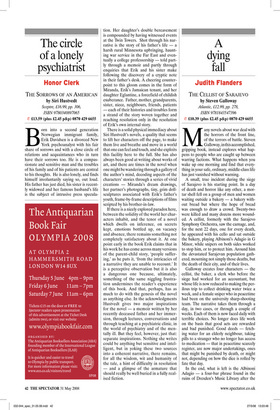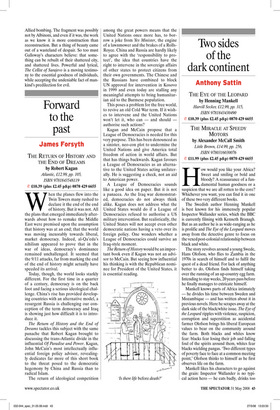A dying fall
Judith Flanders
THE CELLIST OF SARAJEVO by Steven Galloway Atlantic, £12.99, pp. 278, ISBN 9781843547396 ✆ £10.39 (plus £2.45 p&p) 0870 429 6655 Many novels about war deal with the horrors of the front line, of the terrors of battle. Steven Galloway, in this accomplished, gripping book, instead explores what happens to people who are caught up between warring factions. What happens when you wake up one morning and find that everything in your safe, ordinary, middle-class life has just vanished without warning.
A small, true incident during the siege of Sarajevo is his starting point. In a day of death and horror like any other, a mortar shell fell on a group of men and women waiting outside a bakery — a bakery without bread but where the hope of bread was enough to draw a crowd. Twenty-two were killed and many dozens more wounded. A cellist, formerly with the Sarajevo Symphony Orchestra, saw the carnage, and, for the next 22 days, one for every death, he appeared with his cello and sat outside the bakery, playing Albinoni’s Adagio in G Minor, while snipers on both sides worked to stop him, or to protect him. Around him the devastated Sarajevan population gathered, mourning not simply those deaths, but the death of their city, and of their lives.
Galloway creates four characters — the cellist, the baker, a clerk who before the siege had worked for an accountant, but whose life is now reduced to making the perilous trip to collect drinking water twice a week, and a female sniper who in peacetime had been on the university sharp-shooting team. The narrative takes them through a day, in two cases, or through a couple of weeks. Each of them is now faced daily with terrible choices. No longer does life work on the basis that good acts are rewarded and bad punished. Good deeds — fetching water for an elderly neighbour, taking pills to a stranger who no longer has access to medication — that in peacetime scarcely register, are now major undertakings, ones that might be punished by death, or might not, depending on how the dice is rolled by fate that day.
In the end, what is left is the Albinoni Adagio — a four-bar phrase found in the ruins of Dresden’s Music Library after the Allied bombing. The fragment was possibly not by Albinoni, and even if it was, the work as we know it is more construction than reconstruction. But a thing of beauty came out of a wasteland of despair. So too must Galloway’s characters believe: that something can be rebuilt of their shattered city, and shattered lives. Powerful and lyrical, The Cellist of Sarajevo is a moving testimony to the essential goodness of individuals, while accepting the undeniable fact of mankind’s predilection for evil.











































































 Previous page
Previous page